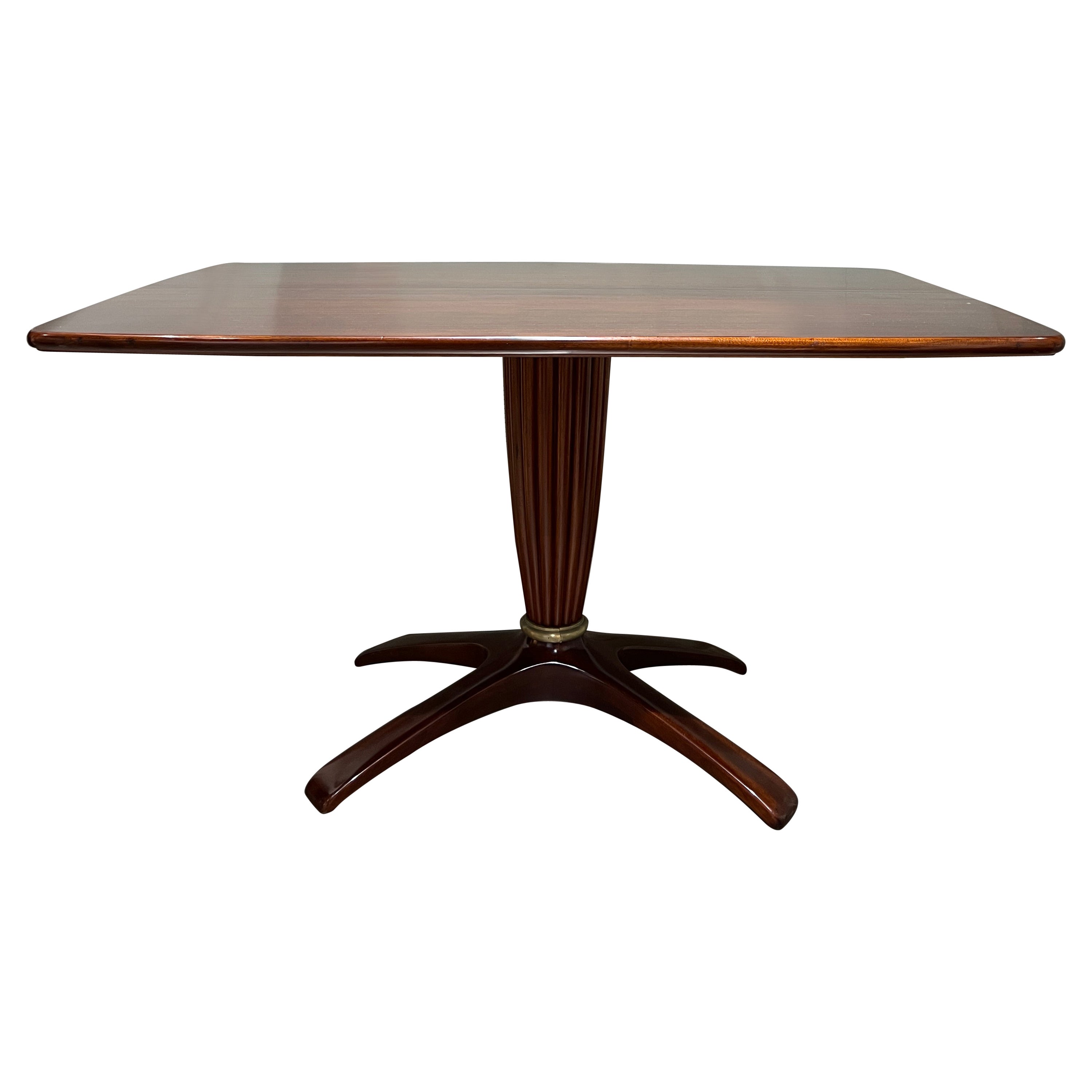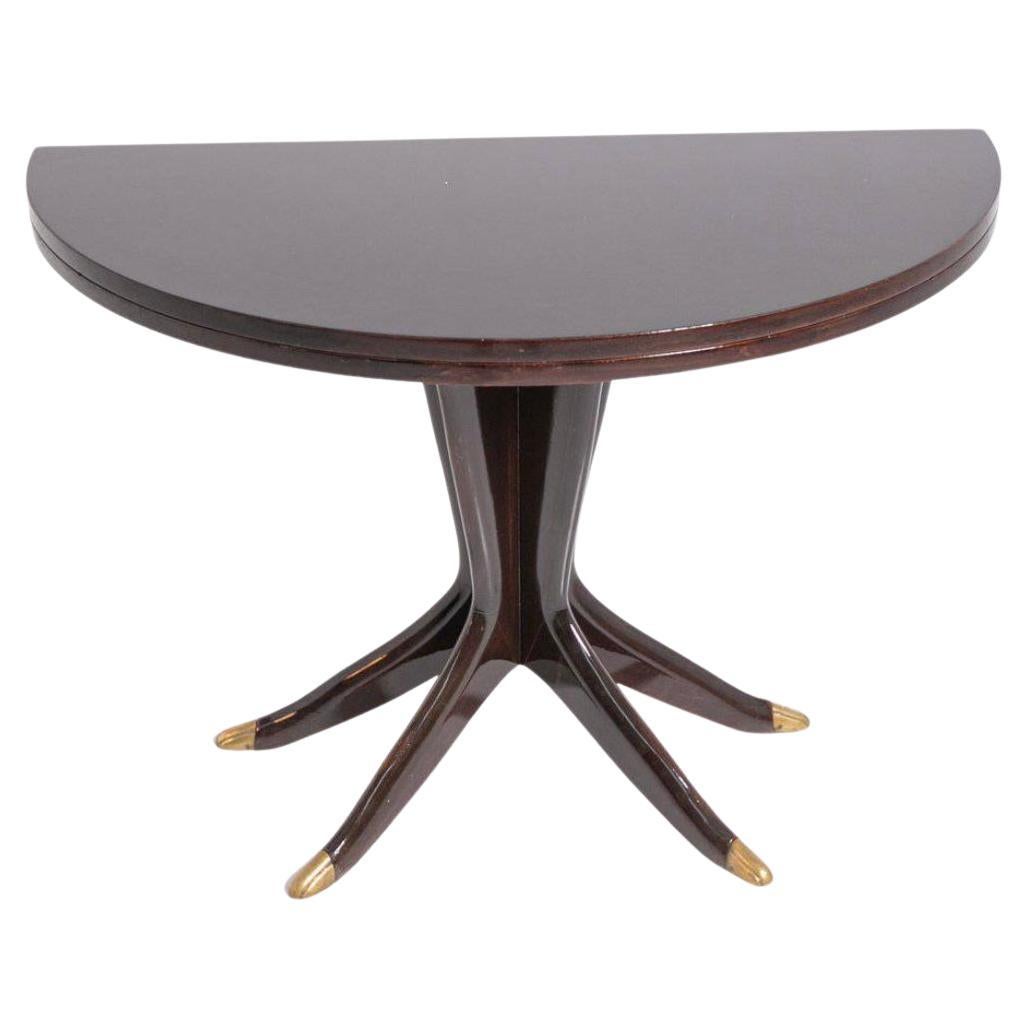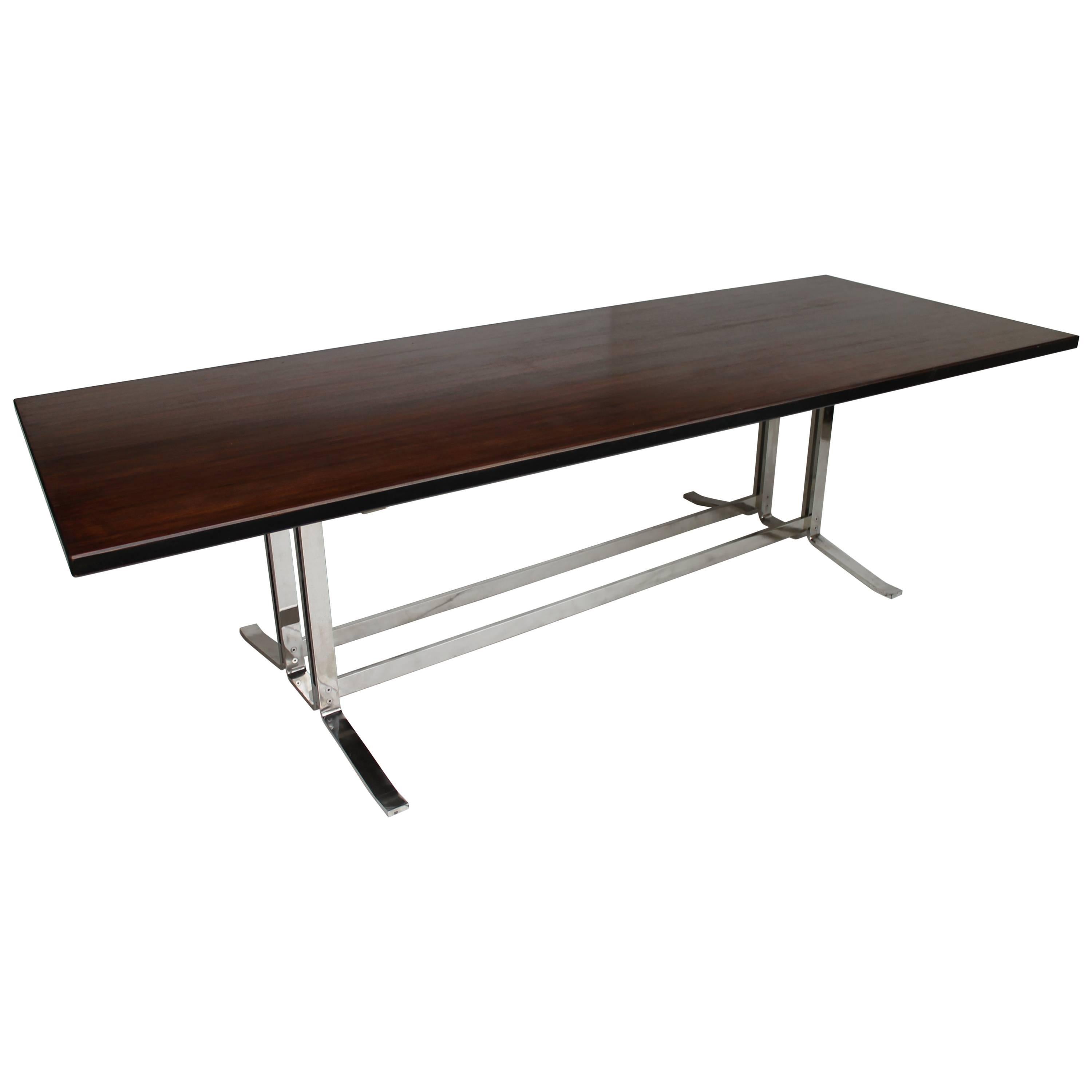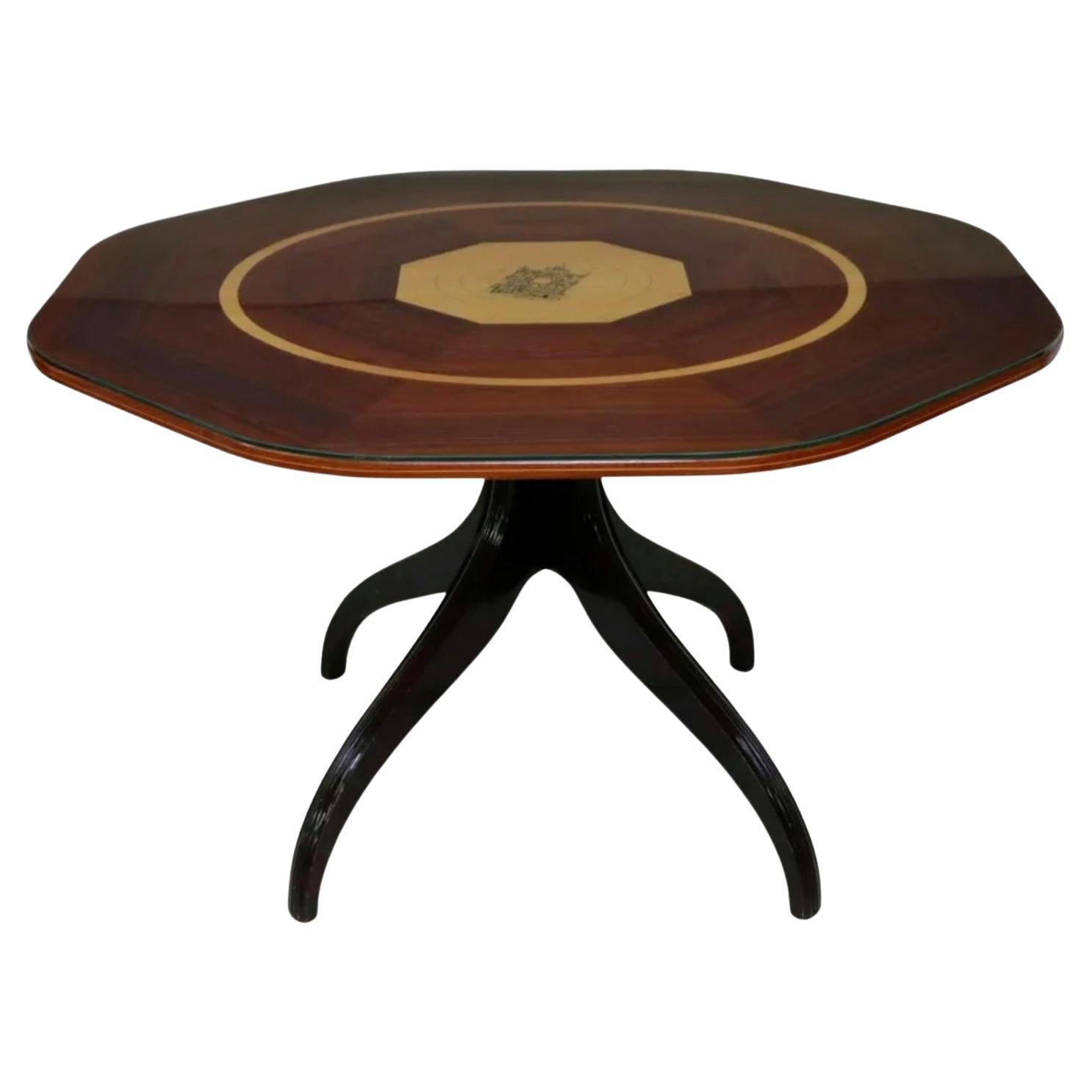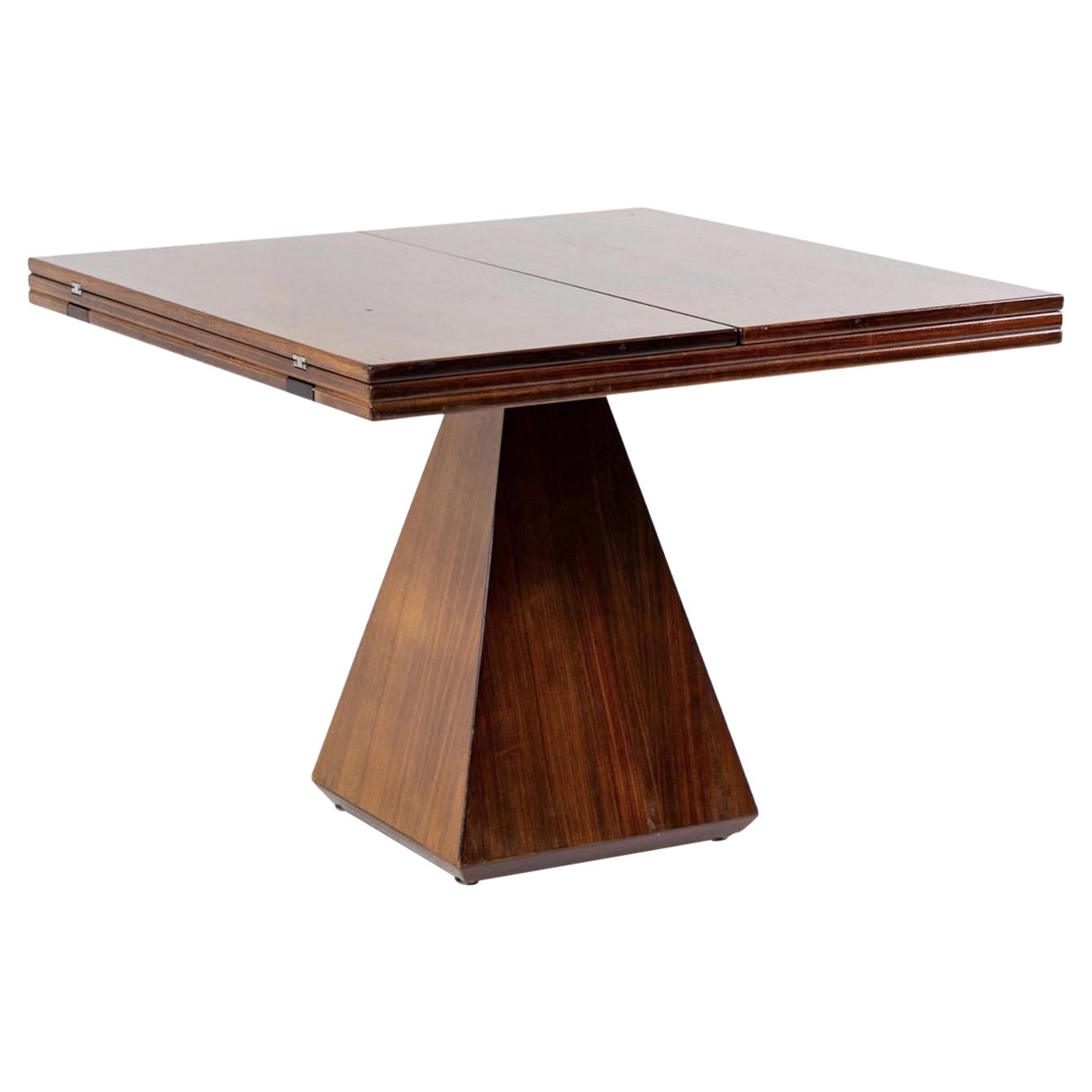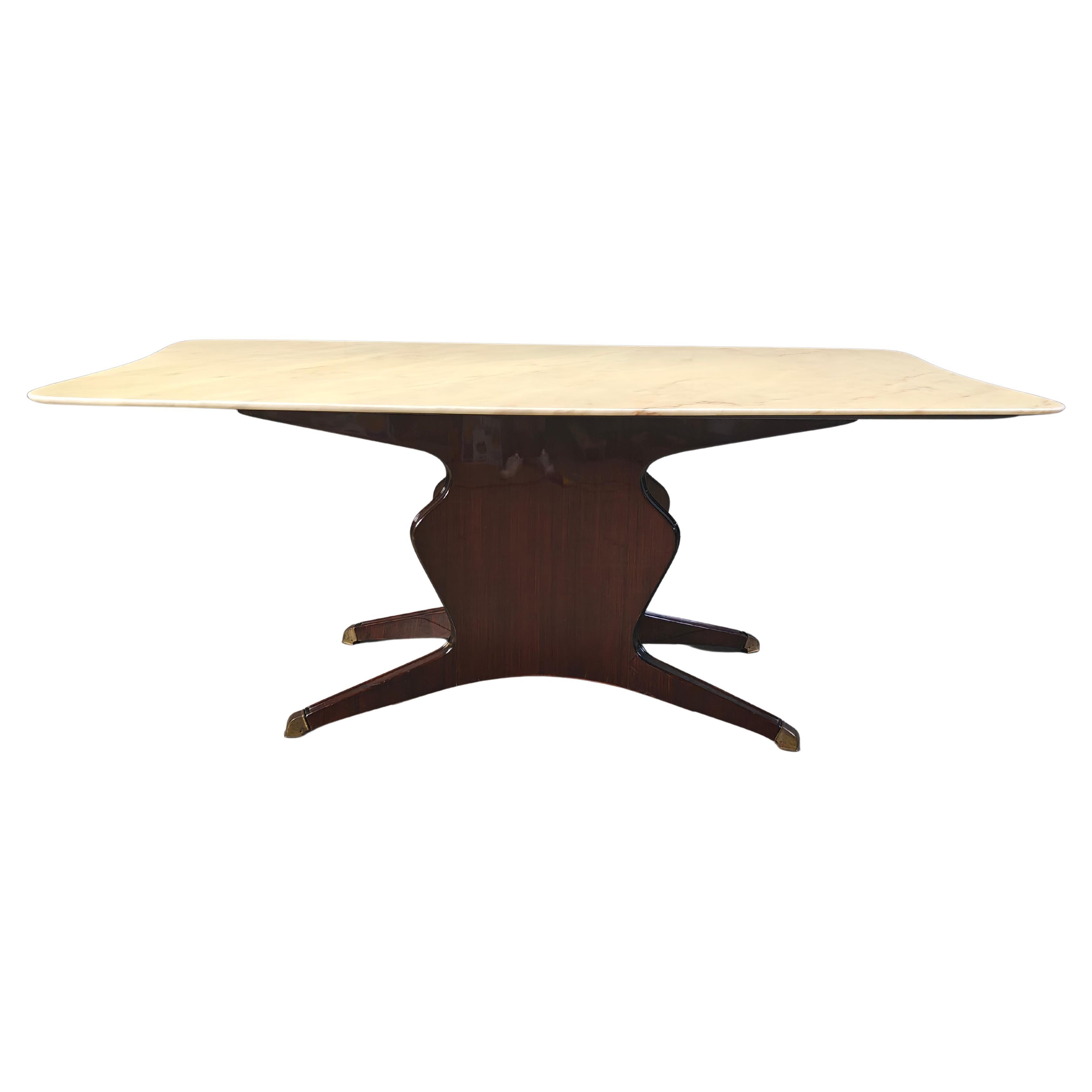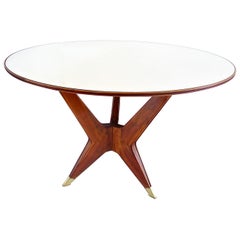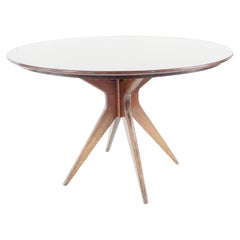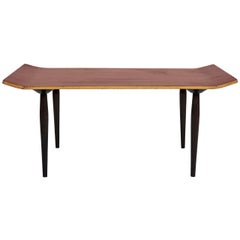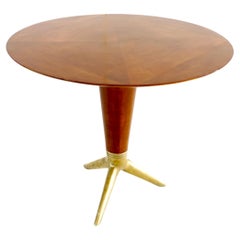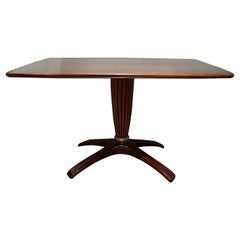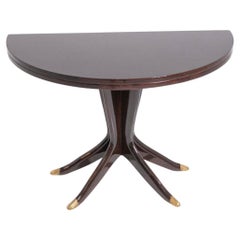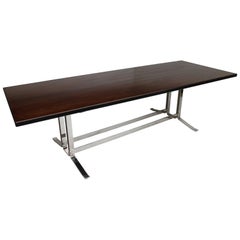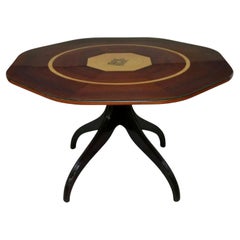Items Similar to Saverio Jannace & Kovac Rosewood Center or Console Table, 1950
Video Loading
Want more images or videos?
Request additional images or videos from the seller
1 of 22
Saverio Jannace & Kovac Rosewood Center or Console Table, 1950
$2,966.03
$5,744.1748% Off
£2,203.26
£4,266.9648% Off
€2,478.50
€4,80048% Off
CA$4,091.84
CA$7,924.4948% Off
A$4,498.06
A$8,711.1948% Off
CHF 2,363.97
CHF 4,578.2048% Off
MX$54,622.84
MX$105,785.6248% Off
NOK 29,489.99
NOK 57,111.9448% Off
SEK 27,939.69
SEK 54,109.5548% Off
DKK 18,867.63
DKK 36,540.0948% Off
About the Item
Rare rosewood center table designed by Saverio Jannace and produced by Jannace & A. Kovacs , circa 1950
important central foot carved and beveled edge of the table
brass detail for a large central ring on the base
four feet
designed as a dining table, ideal in a contemporary decor such as center or console table
rosewood, brass and mahogany on the top
very good condition, excellent original patina, little signs of aging
Misures: 145 x 80 cm h:76 cm; top 3 cm
Biblio: "Roberto Aloi, Esempi di Arredamento Moderno da tutto il mondo.
Tavoli tavolini carrelli; Hoepli, 1956 Tavola n '146" for a photo of the same item.
- Creator:Saverio Jannace (Author),Alex Kovacs (Cabinetmaker)
- Dimensions:Height: 29.93 in (76 cm)Width: 57.09 in (145 cm)Depth: 31.5 in (80 cm)
- Style:Mid-Century Modern (Of the Period)
- Materials and Techniques:
- Place of Origin:
- Period:
- Date of Manufacture:1950
- Condition:a cleaning and polishing job was carried out.
- Seller Location:Rome, IT
- Reference Number:1stDibs: LU950030397802
About the Seller
5.0
Gold Seller
Premium sellers maintaining a 4.3+ rating and 24-hour response times
1stDibs seller since 2012
107 sales on 1stDibs
Typical response time: 1 hour
Associations
20th Century Specialists
- ShippingRetrieving quote...Shipping from: Luni (la Spezia) , Italy
- Return Policy
Authenticity Guarantee
In the unlikely event there’s an issue with an item’s authenticity, contact us within 1 year for a full refund. DetailsMoney-Back Guarantee
If your item is not as described, is damaged in transit, or does not arrive, contact us within 7 days for a full refund. Details24-Hour Cancellation
You have a 24-hour grace period in which to reconsider your purchase, with no questions asked.Vetted Professional Sellers
Our world-class sellers must adhere to strict standards for service and quality, maintaining the integrity of our listings.Price-Match Guarantee
If you find that a seller listed the same item for a lower price elsewhere, we’ll match it.Trusted Global Delivery
Our best-in-class carrier network provides specialized shipping options worldwide, including custom delivery.More From This Seller
View AllIco Parisi Round Walnut Dining Table, Three Feet, 1950
By Ico Parisi
Located in Rome, IT
Important center or dining table in walnut and mirrored top, attributed to Arch. Ico Parisi
mirrored top; the mirror glass is not coeval at the tabl...
Category
Vintage 1950s Italian Mid-Century Modern Center Tables
Materials
Brass
Osvaldo Borsani round dining table, walnut, four feet, circa 1951
By Osvaldo Borsani
Located in Rome, IT
Osvaldo Borsani round dining or center table, circa 1951
produced by Arredamento Borsani Varedo 1951
the table is one of a series od table designed as prototype of model T40
walnut...
Category
Vintage 1950s Italian Mid-Century Modern Center Tables
Materials
Walnut
Osvaldo Borsani T47 Coffee Table 1955
By Osvaldo Borsani
Located in Rome, IT
a rare coffe table T47 designed by Osvaldo Borsani for TECNO 1955;
Zebrawood and black laquared feet; detachable feet
Biblio:G.Bosoni "T...
Category
Vintage 1950s Italian Modern Coffee and Cocktail Tables
Materials
Zebra Wood, Walnut
Rare Maple and Brass Round Center Table by I.S.A. Bergamo 1950
By Gio Ponti, I.S.A. Italy
Located in Rome, IT
Stunning maple and brass center table.
previously thought to be designed by Gio Ponti the table is manufactured by I.S.A Bergamo . ISA produced many famous pieces designed by some o...
Category
Vintage 1950s Italian Mid-Century Modern Center Tables
Materials
Brass
Paolo Buffa round center or game table, walnut, five hidden drawers, 1950
By Paolo Buffa
Located in Rome, IT
elegant and fine game table by Arch. Paolo Buffa, circa 1950
also available as a center table
five sculptural and carver legs, five hidden drawers, inlayed patterned top
very good ...
Category
Vintage 1950s Italian Mid-Century Modern Game Tables
Materials
Walnut
large Cesare Lacca walnut coffee table, three feet irregular shape, mirrored top
By Cesare Lacca
Located in Rome, IT
fine and elegant large coffee table or occasional table
designed by Arch. Cesare Lacca, 1950
irregular shape, fine worked legs, three feet, mirrored and beveled top
walnut and mir...
Category
Vintage 1950s Italian Mid-Century Modern Coffee and Cocktail Tables
Materials
Mirror, Walnut
You May Also Like
Mahogany Italian table 1950 Saverio Jannace Milano
By Jannace e Kovacs
Located in PARIS, FR
A mahogany console center or dining table Italy 1950 attributed to Savario Jannace
Beautifull vintage condition
Category
Vintage 1950s Mid-Century Modern Center Tables
Materials
Brass
Mid-Century Wooden Console Table by Ico Parisi Attr., Italy, 1950s
By Ico Parisi
Located in Argelato, BO
Rare and elegant Mid-Century wooden console table by Ico Parisi Attr., Italy, 1950s
This is a console table that can be transformed into a table, which thanks to its small size can ...
Category
Vintage 1950s Italian Mid-Century Modern Console Tables
Materials
Wood
Mid-Century Italian Formanova rosewood Table by Gianni Moscatelli, circa 1965
By Formanova, Gianni Moscatelli
Located in Sacile, PN
Dinner or Conference table designed by Gianni Moscatelli for Formanova, dated circa 1965.
Big dimension, chromed metal structure and veneer rosewood top.
Formanova born from the cr...
Category
Vintage 1960s Italian Mid-Century Modern Conference Tables
Materials
Metal
Osvaldo Borsani Mid-Century Modern Italian Rosewood Maple Parquetry Center Table
By Osvaldo Borsani
Located in Forney, TX
A scarce midcentury Italian modernist center table attributed to legendary designer Osvaldo Borsani (Italy, 1911-1985), circa 1950s.
Featuring an octagonal rosewood and maple parque...
Category
Mid-20th Century Italian Mid-Century Modern Center Tables
Materials
Wood, Maple, Rosewood
20th Century Italian Saporiti Extendable Mahogany Table by Vittorio Introini
By Vittorio Introini, Saporiti
Located in West Palm Beach, FL
A dark-brown, vintage Mid-Century modern Italian extendable geometric dining room table made of hand crafted polished Mahogany and Rosewood, designed by Vittorio Introini and produce...
Category
Mid-20th Century Italian Mid-Century Modern Card Tables and Tea Tables
Materials
Metal, Chrome
Mid century rosewood and marble dining table by Osvaldo Borsani, 1950s
By Osvaldo Borsani
Located in Leuven, Vlaams Gewest
Beautiful and elegant dining table designed by Osvaldo Borsani with a beautifully shaped marble top, elegant base and brass feet.
This is a prime example of mid century italian desi...
Category
Vintage 1950s Italian Mid-Century Modern Dining Room Tables
Materials
Marble, Brass
More Ways To Browse
Marble Split Table
Table A Gibier
Thomas Britt
Claw Feet Foot
Claw Feet Round Table
Irish Marquetry Table
Laminate Curved Table
Marble Top Foyer Table
Most Expensive Item
Octagonal Drum Table
Osvaldo Borsani Marble Center Table
Parlour Table
Round Mahogany Foyer Table
Round Salon Table
Swan Center Table
Theodore Alexander Iron
Tornado Table
Alexander Roux
